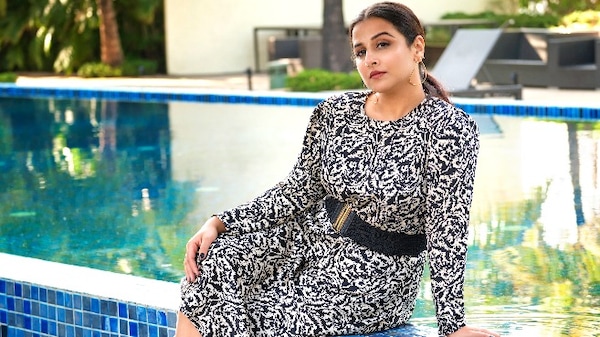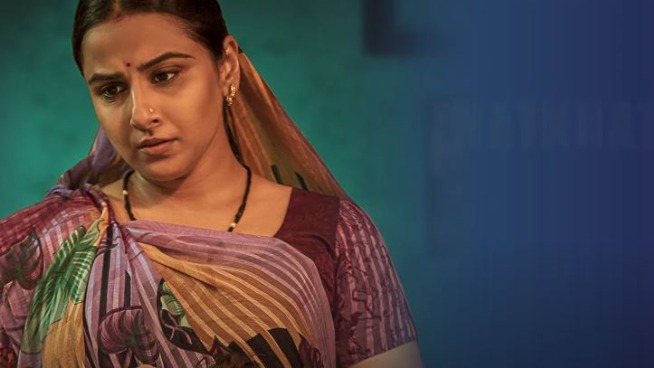OTTplay Exclusive! Vidya Balan: I love doing commercial films
Vidya Balan spoke to OTTplay exclusively for her short film Natkhat.

Last Updated: 10.00 AM, Jul 24, 2021
While Vidya Balan was still getting over the success of Sherni, the actress has another film to look forward to. Her short film Natkhat is slated to release as a part of Voot Select Film Festival.
While talking to OTTplay exclusively ahead of its release, Vidya also spoke about commercial cinema, turning a producer and working with a six-year-old girl who plays her son in Natkhat.
Excerpts from the interview:
Natkhat is a story that rips your guts out. As we come closer to the end, we realise something has gone extremely wrong in your character's life. Your recent character Sherni was also quiet till the very end. Is that a quality that attracts you in a character?
Not really. Here, even though she’s experiencing domestic abuse, she finds the strength to tell her son a story hoping that it will correct his attitude towards women and make him understand that we’re all children of the same God - no one is less or more. I don’t think it’s a conscious attempt on my part to choose characters like that. With experience, you realise that inner strength manifests in various ways. Even for her, to be able to surpass her pain and yet, hope that her child won’t turn out like the men in her life, that is commendable, it’s a show of strength. In that situation, she’s probably feeling powerless but is showing great strength of character by telling her son the story and making him realise that every time he behaves or misbehaves with a woman, she gets punished for it.
You have done your share of commercial cinema but now pick films revolving around your character completely and drive a strong message as well. Do you think you can go back to doing commercial roles at this point of time?
Very much. I am a commercial actor. I hope I can leverage that when I do films that aren’t conventionally commercial. I love doing commercial films, even if not the typical ones. It’s my first love - to entertain.

Do you think Natkhat could have turned into a 2-hour feature film?
No. When I first got the script, I couldn’t believe that this was going to be a short film. I would wonder how you could explore so much in a short film. When I read the script, I knew it’s possible. When I watched the film, I said thank god! The film makes you uncomfortable. It’s a punch in the gut. Therefore, two hours might have been too much. A short film is the perfect format for such a story.
The art of storytelling while a parallel story runs with the film, isn't something that is usually explored in movies. Whose idea was that?
Our director and writer.
With a film like Natkhat, there needs to be a perfect balance to keep the audiences hooked. When storytelling comes into play, were you confident that they have to connect with the story?
As an audience, it requires a lot of attention on my part to get a story within a story. Having said that, I thought this was a very interesting tool. As an actor, I’m open to exploring all kinds of storytelling. It was an effective tool, especially with the child.
Tell me about turning a producer with Natkhat. What has the new journey been like?
I’m very grateful to have my name attached to this film as both an actor and a producer. It has all been done by (Ronnie Screwvala’s) RSVP.
At a very young age, you weren't afraid to play a mother (Heyy Babyy) and have taken up that role once again. You never shy away from doing diverse roles. Is that what you would call your USP as an actor?
It’s what keeps me going. I’m interested in people, so when I get to play different people in different films, that keeps me motivated. They’re all different individuals as a role.
Your on-screen son is actually a girl. What were her thoughts on the script?
She’s adorable. I forgot on sets that she was a girl. We used to call her Sonu. She was so cute in a pyjama kurta and school uniform. It didn’t matter if it was a girl playing a boy but she played it so well.
Coming to her thoughts on the script, I don’t even know if she understood because she’s just a six-year-old. She was more excited about facing the camera. They would play on the sets before and after the scene, so they could disconnect from what was happening. It was so beautiful that the children were not affected after the scene was cut.
Did you converse with her about the subject of the film and your equation before actually diving deep into it?
It wasn’t required. She did not have to know it. That’s the beauty of the character. Sonu is an innocent boy who is just mimicking the behaviour of others around him. Children don’t know what they’re doing and so you need to be careful around them.
Will we see you take up light-hearted films under your production house in the future?
I don’t have a production house and I’m not planning to produce. This just happened to me so I thought of it as the icing on the cake. Ronnie credited me as a producer in lieu of the fee. I was more than happy to do the film. I don’t think I have the mind, capability, desire or mind space to be a producer. It requires a lot of patience. I know because I’m married to a producer.
So you have no plans of becoming a producer, but is there anything off-camera that you’d like to explore?
No way. I love being in front of the camera. There’s nothing that will distract me from that.
Subscribe to our newsletter for top content, delivered fast.

